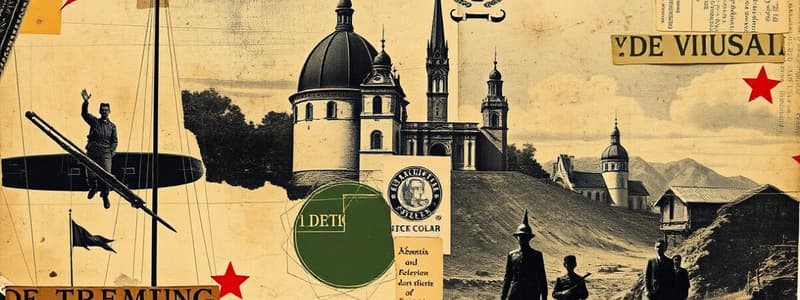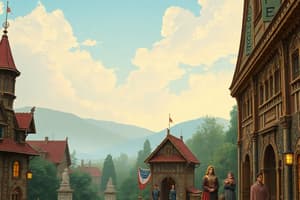Podcast
Questions and Answers
What is the primary focus of the Nibelungenlied as an epic saga?
What is the primary focus of the Nibelungenlied as an epic saga?
- The quest for immortality by King Gilgamesh
- The battles of Beowulf against various monsters
- The adventures of the Knights of the Round Table
- The story of Siegfried and the revenge of Kriemhild (correct)
What common theme links sagas and legends according to the content?
What common theme links sagas and legends according to the content?
- The use of real historical figures exclusively
- The presence of modern technology
- Cultural values and heroic ideals (correct)
- Focus on everyday life struggles
Which character is known for his quest to battle Grendel in the epic poem Beowulf?
Which character is known for his quest to battle Grendel in the epic poem Beowulf?
- Beowulf (correct)
- Siegfried
- Robin Hood
- King Gilgamesh
Which of the following tales includes elements of magic and supernatural characters?
Which of the following tales includes elements of magic and supernatural characters?
What is the main conflict in the Volsunga Saga?
What is the main conflict in the Volsunga Saga?
Who published a significant work discussing the archetypal hero in mythologies?
Who published a significant work discussing the archetypal hero in mythologies?
Which of the following is NOT a characteristic of sagas and legends?
Which of the following is NOT a characteristic of sagas and legends?
What theme does the legend of Robin Hood primarily represent?
What theme does the legend of Robin Hood primarily represent?
What does Telemachus seek during his journey in the Odyssey?
What does Telemachus seek during his journey in the Odyssey?
What is Penelope characterized by in her narrative within the Odyssey?
What is Penelope characterized by in her narrative within the Odyssey?
Which of the following themes is NOT associated with the Great Themes of Myth?
Which of the following themes is NOT associated with the Great Themes of Myth?
What was one purpose of myths according to the provided information?
What was one purpose of myths according to the provided information?
Which collection is mentioned as a source of mythology aimed at educating princes?
Which collection is mentioned as a source of mythology aimed at educating princes?
What term did Campbell use to describe the common structure of important myths from around the world?
What term did Campbell use to describe the common structure of important myths from around the world?
Which stage of the hero's journey is characterized by a transformative experience often symbolized by being swallowed or descending into a dark space?
Which stage of the hero's journey is characterized by a transformative experience often symbolized by being swallowed or descending into a dark space?
What does the term 'Apostheosis' refer to in the context of the hero's journey?
What does the term 'Apostheosis' refer to in the context of the hero's journey?
Which step follows the 'call to adventure' in Campbell's hero's journey?
Which step follows the 'call to adventure' in Campbell's hero's journey?
What perspective did Campbell acknowledge as being largely absent in traditional mythologies?
What perspective did Campbell acknowledge as being largely absent in traditional mythologies?
In the hero's journey, what is indicated by the 'freedom to live' stage?
In the hero's journey, what is indicated by the 'freedom to live' stage?
What does the 'road of trials' signify in Campbell's hero's journey?
What does the 'road of trials' signify in Campbell's hero's journey?
Which of the following characters is associated with the concept of 'the belly of the whale'?
Which of the following characters is associated with the concept of 'the belly of the whale'?
What does the theory of Ritualism propose about the origin of myths?
What does the theory of Ritualism propose about the origin of myths?
Which modern theory argues that myths spread from a few cultural centers throughout the world?
Which modern theory argues that myths spread from a few cultural centers throughout the world?
According to Freudianism, what relationship do myths have with the human mind?
According to Freudianism, what relationship do myths have with the human mind?
How might the death and rebirth of gods in various myths be interpreted?
How might the death and rebirth of gods in various myths be interpreted?
What is one main characteristic of Evolutionism in the context of myth-making?
What is one main characteristic of Evolutionism in the context of myth-making?
What distinguishes heroic figures in myths?
What distinguishes heroic figures in myths?
How are monsters and demons typically portrayed in myths?
How are monsters and demons typically portrayed in myths?
What role do animals often play in myths?
What role do animals often play in myths?
What common theme is found in mythological journeys?
What common theme is found in mythological journeys?
What dual nature does the concept of the underworld commonly convey in myths?
What dual nature does the concept of the underworld commonly convey in myths?
In mythology, what is a common interpretation of the destruction of worlds?
In mythology, what is a common interpretation of the destruction of worlds?
What is often a significant outcome of quests in myths?
What is often a significant outcome of quests in myths?
What theme does the concept of animals often highlight in mythical narratives?
What theme does the concept of animals often highlight in mythical narratives?
Flashcards are hidden until you start studying
Study Notes
Sagas and Legends
- Blend of historical events or figures with fictional elements, often containing supernatural occurrences.
- Nibelungenlied: A Germanic epic that narrates the tale of Siegfried, his murder, and Kriemhild's revenge.
- Volsunga Saga: Chronicles the history of the Volsung family, features the hero Sigurd, and includes the cursed ring of the Nibelungs.
- King Arthur and the Knights of the Round Table: Central to British folklore, highlighting themes of chivalry and heroism, featuring Excalibur and the Quest for the Holy Grail.
- The Legend of Gilgamesh: An ancient Mesopotamian narrative of King Gilgamesh's quest for immortality.
- Beowulf: An English epic poem depicting the hero Beowulf's battles against Grendel, Grendel’s mother, and a dragon.
- Robin Hood: The story of an outlaw famed for "robbing from the rich to give to the poor".
Myths and Folktales
- Represent primitive fiction aimed for entertainment, often involving magic and supernatural characters like ghosts or elves.
- Myths serve to explain life's mysteries, cultural values, and human relationships with nature.
Joseph Campbell's Monomyth
- Introduced the concept of the hero's journey in "The Hero with a Thousand Faces".
- Monomyth structure includes stages: Departure, Initiation, and Return, marking the journey of an archetypal hero.
- Departure: Involves the call to adventure, initial refusal, and transformative experiences symbolized by the "belly of the whale".
- Symbolism of "belly of the whale" signifies separation from the old self and initiation into a transformative journey.
- Initiation: Hero endures trials, meets significant female figures, and undergoes atonement with the father, ultimately achieving a moment of realization or empowerment.
- Return: Encompasses the hero's reluctance to return, rescue, mastery of both worlds, and the freedom to live anew.
Gender Perspectives in Mythology
- Campbell acknowledged the male-centric view of traditional mythologies and sought female perspectives in fairytales.
- Example: In "The Odyssey", Telemachus, Odysseus, and Penelope each represent different journeys and aspects of human experience.
Sources of Mythology
- Key texts include Aesop’s Fables, A Thousand and One Nights, The Great Epics of the World, and The Poems of Hesiod.
Themes in Mythology
- Creation: Myths often portray a creator deity bringing forth the cosmos and life forms.
- Gods and Goddesses: Ideal beings embody human characteristics, reinforcing societal structures.
- Heroic Figures: Semi-divine beings who undertake monumental challenges, often opposing divine or monstrous forces.
- Animals: Represent duality, from predatory threats to helpful companions, often rich in symbolism about nature and death.
- Journeys and Quests: Characterized by trials that test strength and loyalty, frequently involving journeys to the underworld.
- Destruction: Myths explore themes of world-ending scenarios, often influenced by moral failings or cosmic battles.
Theories of Mythology
- Ritualism: Suggests myths explain religious rituals and their significance within cultures.
- Diffusionism: Proposes myths originated in specific cultural centers, spreading globally.
- Freudianism: Connects dreams and myths, asserting myths arise from repressed emotions and experiences within the subconscious.
- Evolutionism: Myth development reflects societal advancement and changes.
Studying That Suits You
Use AI to generate personalized quizzes and flashcards to suit your learning preferences.




